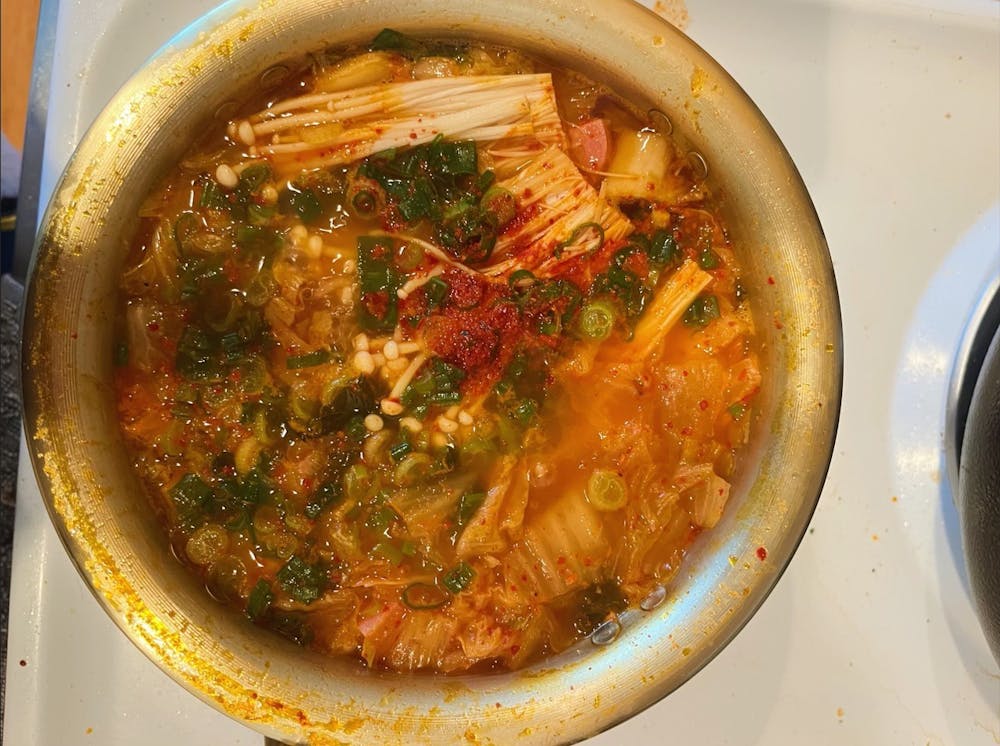I’ve cooked and prepared a variety of dishes throughout my college career, but my favorites are always the ones that remind me of home. My mother’s homemade Korean meals hold a very special place in my heart.
One of the dishes that brings me the highest sense of comfort and nostalgia is kimchi jjigae, or kimchi soup. Kimchi is a Korean side dish made of salted, fermented vegetables and is usually centered around cabbage. It is best known for its savory yet tangy and spicy flavor which is what makes it so unique and unlike most other dishes. Many different dishes can be made from kimchi, with one of my favorite variations being kimchi jjigae. Kimchi jjigae is a very well-known Korean dish that is a staple in most Korean households. In my household, my mom would prepare kimchi jjigae almost every week, reminding me each time how much I enjoy this dish.
Coming to the University, dining hall food and Cookout unfortunately never satisfied cravings for home cooked Korean food. In order to satisfy this craving, I took it upon myself to learn how to make kimchi jjigae in my college apartment kitchen. This stew, infused with the strong and unique flavor of kimchi, is the perfect meal to share with friends and family and keep you warm this winter season.
Most of these ingredients can be found either at your local grocery store or Asian specialty stores such as Asian Express and C’Ville Oriental — only around a 10-minute car drive away from central Grounds.
Prep Time: 30-40 minutes
Yields: 4-5 bowls
Ingredients:
- 1 pound kimchi, cut into bite size pieces
- ¼ cup kimchi brine
- ½ pound pork shoulder (optional) (or pork belly).
- ½ package of tofu (optional), sliced into ½ inch thick bite size pieces
- 3 green onions
- 1 medium onion, sliced (1 cup)
- 1 tsp kosher salt
- 2 teaspoons sugar
- 2 teaspoons gochugaru (Korean hot pepper flakes)
- 1 tablespoon gochujang (hot pepper paste)
- 1 teaspoon toasted sesame oil
- 2 cups of anchovy stock (or chicken or beef broth)
Instructions:
- Put your kimchi and kimchi brine in a medium sized pot (about 2 quarts).
- Slice your pork into half-inch thick and two-inch long pieces, roughly.
- Add your cut pork and sliced onion.
- Chop your green onions and add them to the pot with the kimchi and kimchi brine.
- Add salt, sugar, Korean hot pepper flakes and hot pepper paste.
- Drizzle sesame oil over the top.
- Let this cook over low heat for about five minutes.
- Pour in your chosen stock.
- Cover your pot and cook for 10 minutes over medium high heat.
- After 10 minutes, uncover the pot and stir with a spoon.
- Lay your tofu over the top of the stew.
- Cover the pot and cook for another 10 to 15 minutes over medium heat.
- Chop one green onion and sprinkle over top of the stew.
- Remove pot from heat and serve with rice.
What I enjoy most about this dish is how easy it is to prepare. I’m able to reach into my fridge, which is almost always stocked with kimchi, and put whatever I please into the stew. Feel free to sub out and sub in any ingredients to your liking. I often find myself throwing in any veggies that are in my fridge that I need to get rid of, and it always tastes just as good. I personally like to add mussels into my kimchi jjigae to add brothy seafood flavor. Enjoy this spicy yet tangy stew that is full of authentic Korean flavors with rice or just by itself. As I prepare myself for the very cold start of this semester, I know that this kimchi jjigae recipe will warm me right up and give me a taste of home.







